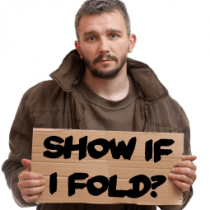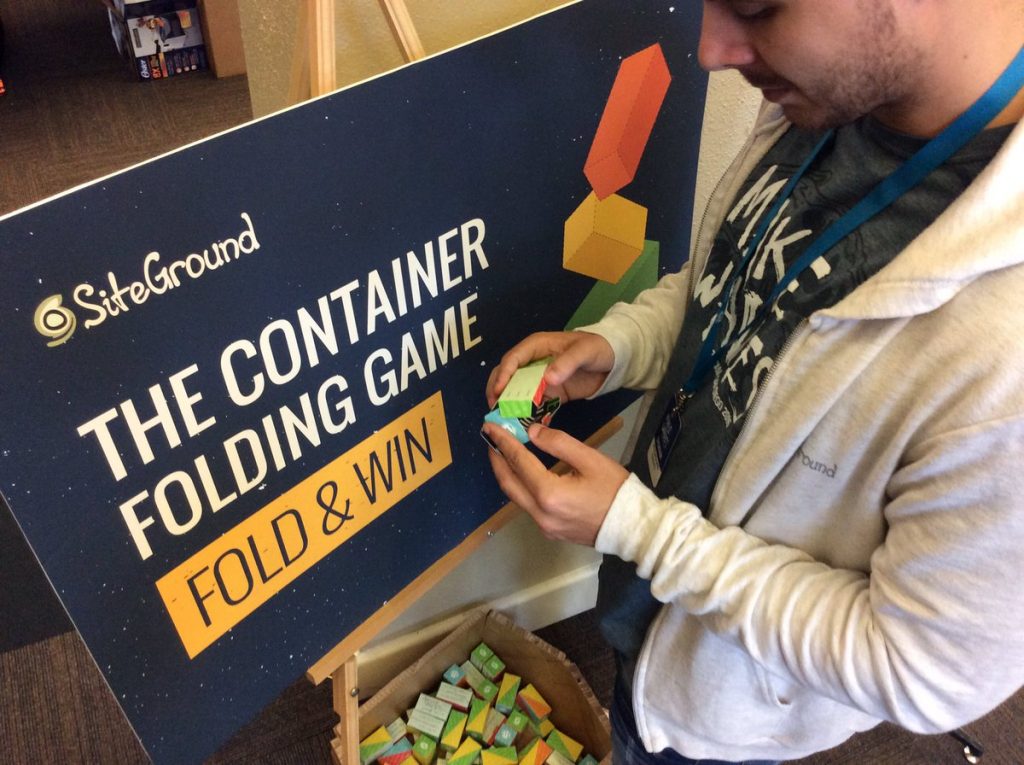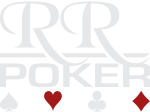The question “Will you show if I fold?” is heard a lot. Most players have heard this question many times and will have a stock response to this phrase, like “Maybe” or “I don’t answer that,” or they will just keep quiet. For this reason, most responses to this question won’t contain much information.
Sometimes, though, an answer might reveal how relaxed a player is. Let’s look more closely at the affirmative and negative responses to this question.

“Yes, I’ll show you.”
Affirmative responses, like “Yeah, sure” or “Sure, I’ll show you,” can have a wide range of meanings. Many players are capable of answering affirmatively with a wide range of hands. (There’s much more information on this subject in the Verbal Poker Tells book. For now, we’ll keep it simple and just say that it’s hard to interpret affirmative responses.)
For this reason, there aren’t many good generalizations that can be made about a willingness to show cards. Information gathered from this response will mostly have to depend on player history and situation. For example, some players may tend to say “yes” to this question more when weak; others may tend to do this more when strong.
Sometimes affirmative responses will be accompanied by extraneous phrases that might clue you in to a player’s comfort level. Extraneous phrases will be more meaningful than the affirmative response. For example, a player is asked, “Will you show if I fold?” and he replies, “Yeah, sure. Why not? But you’ll owe me one.” His willingness to speak more than is necessary may be an indicator of relaxation.
Or a player’s general demeanor and way of answering may be information in itself about a player’s level of relaxation. For example, a player may just be more physically loose as he answers you, moving around more. Or making more eye contact as he interacts with you.
“No, I won’t show you.”
Negative responses to this question are much more meaningful than affirmative responses. Negative responses are more likely to be indicators that a player has a strong hand.
This is because some negative responses can be interpreted as unfriendly or goading, and bluffers usually don’t want to risk making an opponent upset. Most bluffers want to stay friendly and conciliatory. Usually, if a bluffer is asked this question, he’ll either stay quiet or answer “Maybe” or “I don’t know” in a neutral way.

This pattern is especially reliable when negative responses are accompanied with irritated or angry ways of speaking. A bettor who’s willing to display irritation when asked this question is unlikely to be bluffing.
Examples
$2-5 NLHE cash game
In a 3-way pot, on a river board of 6♦ 4♥ 3♦ K♠ 5♣, a player bets $130 into the $160 pot. Her opponent asks, “Will you show if I fold?”
She laughs in an irritated way and shakes her head emphatically.
Her opponent asks, “No?”
She says, “No” quite sternly.
A recreational player willing to show irritation in response to this question is usually going to be strong.
Results: Her opponent calls. The bettor has 8♦ 7♦, for the nut straight.
$1-2 NLHE cash game
The river board is 8♠ 6♦ 4♠ Q♥ 2♥. The player who had bet the turn now bets $120 into a pot of $150.
Zach says, “I’ve got a big pair. Will you show if I fold?”
The player says quickly, with a lot of emphasis, “Sure!”
While the agreeing to show wasn’t meaningful on its own to Zach, this player’s immediate and loose response made Zach confident he was relaxed.
Results: Zach folds his A♠ Q♠. The player shows Q♦ 8♦, for top two pair.
High Stakes Poker, high stakes NLHE cash game
On a river board of 7♣ 4♦ 2♠ J♦ K♥, Sam Farha bets $20,000 into a pot of $22,400. Fred Chamanara considers.
Chamanara and Farha talk a long time as Chamanara thinks. Farha is very talkative and very exuberant. One of their last interactions is this:
Chamanara: “Tell you what; you gonna show your hand to me?”
Farha (immediately, dismissively): “Never, to nobody. But I’ll do some business deal, what do you want me to do? Take five back or…” They continue to talk

Results: Chamanara folds his 9♠ 9♦. Farha has J♥ 4♥ for two pair.
Farha’s immediate and exuberant negative response to Chamanara’s question makes a bluff unlikely.
$1-2 NLHE cash game
Zach has A♥ K♦ and he’s heads-up with the pre-flop raiser. The flop is 7♦ 5♠ 2♠. Zach check and he checks behind.
The turn is the T♠. Zach checks and he bets $50 into the $30 pot. Zach calls, and is prepared to call many river bets.
The river is the 9♠, putting four spades on the board.
Zach checks and he bets $100 into the $130 pot. Zach asks, “Will you show if I fold?”
He thinks a bit, looking very uncertain, and says, “Uhhh… yeah, if you fold.” He puts a good amount of emphasis on the “if.”
Results: Zach folds and he shows A♣ Q♠, for the queen-high flush.
The “uhhh” in this player’s statement made it unlikely he was bluffing. Bluffers don’t like to show uncertainty. Also, his emphasis on the “if” made it seem like he was emphasizing that he wanted a fold; that he’d show only if Zach folded. Considering how purposefully weak his phrasing seemed to be, Zach thought it was likely he was actually strong.
Overall, though, just the amount of looseness and modulation in his response are indicators of relaxation. Bluffers usually have an instinct to reply in normal and neutral ways, if they respond at all.
Summary
In general, you shouldn’t read too much into responses to this question, unless they contain other pieces of information, such as: a rude demeanor or phrasing, or physically relaxed or loose accompanying behavior.
src: readingpokertells.com

